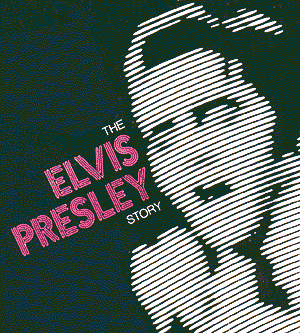
The Elvis Presley Story Watermark radio show
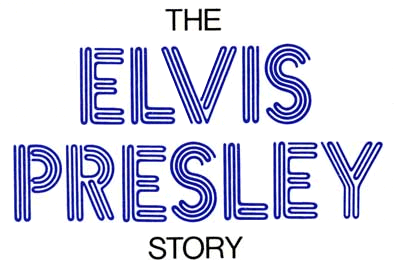
Produced by Watermark INC., narrated by Wink Martindale and story content based on the best selling book "ELVIS" by Jerry Hopkins, this program came second to none, in providing the Elvis fans with informative interviews with family and friends who had worked with Elvis through the years, thus allowing one to hear the master at work through his musical journey in chronological order, and allowing one to listen to insightful interviews of Elvis himself.
1971 was the year this program became available for the first time as a 12 hour radio documentary.
In 1975 the program was updated with new information and song, making it a 13 hour program.
In 1977 the program was rearranged to adapt the program to Elvis' premature death, with adding and taking away information to update the year to 1977, leaving the documentary still a 13 hour program.
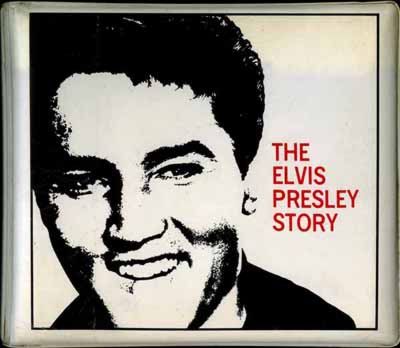
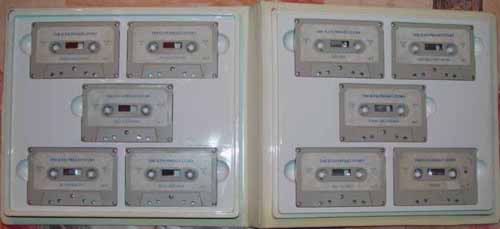
"The Elvis Presley Story 1971 Promo
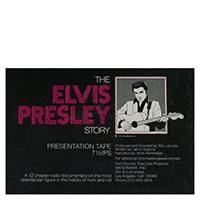
Hour 1
The Early Years
Hour 2
The Sun Records Chapter
Hour 3
Presleymania
Hour 4
Presleymania Part 2
Hour 5
Elvis The Pelvis Goes To War
Hour 6
Homecoming
Hour 7
The Movies Era: Part One: A decade of Seclusion
Hour 8
The Movies Era: Part Two: Viva Las Vegas
Hour 9
Elvis Meets The Beatles / Marriage
Hour 10
Changes
Hour 11
King Of The Strip - Las Vegas
Hour 12
Finale
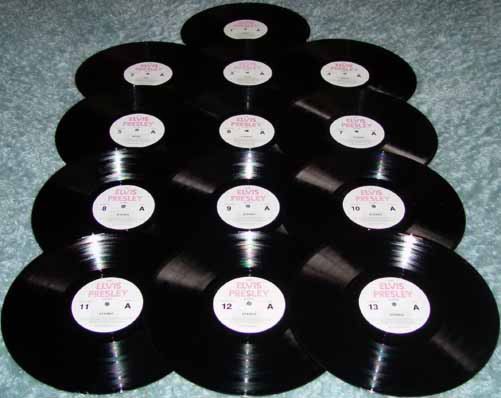

"The Elvis Presley Story 1975 Promo
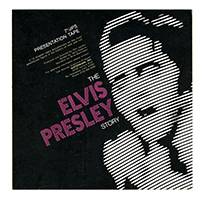
Hour 1
THE EARLY YEARS
The Presley's in Memphis. Hume High School. Elvis Favorite singing Groups. Gospel and Rhythm & Blues influences. Elvis' first job. Why Elvis wore his hair long. Elvis sings for schoolmates. Truck driving for the Crown Electric Company. Elvis synthesizes Country & Western, R&B, pop and folk music into a new musical form.
Timing chart:
Net: 50'15
Intrumental runout - Blue Suede Shoes / Sandy Nelson: 1'45
Overall: 52'
Hour 2
THE SUN RECORDS CHAPTER
How a $4 record for his mother brings Elvis his first recording contract. The Swivel-hips arrive. Grand Ole Opry and Louisiana Hayride appearances.
Elvis is called "Hillbilly Cat". His live appearances fill baseball parks. Col. Thomas Andrew PArker. Elvis leaves Sun Records. Elvis' first chart record.
The Presley's in Memphis. Hume High School. Elvis Favorite singing Groups. Gospel and Rhythm & Blues influences.
Timing chart:
Net: 50'42
Intrumental runout - Mystery Train / James Burton: 3'13
Overall: 54'15
Timing chart:
Net: 50'42
Intrumental runout - Mystery Train / James Burton: 3'13
Overall: 54'15
Hour 3
PRESLEYMANIA
First RCA recording session. The Jimmy Dorsey Show makes ratings history. Gracveland. The critics voice thumbs-down on elvis' TV dates.
Elvis answers his critics. Elvis and rock'n'roll linked to juvenile delinquency. Elvis' first movie. The Elvis Presley Youth Center. The importance of Colonel Parker.
Timing chart:Net: 50'23
Intrumental runout - Don't Be Cruel / Bill Black: 2'06
Overall: 52'29
Hour 4
PRESLEYMANIA PART 2
Hollywood again and Elvis' second film, "Loving you". The ultimate Teenage Shopping List. 26,700 reasons why elvis could'nt stop singing.
The actual sounds of Presleymania. A most peculiar by-product of Presleymania. "Jailhouse Rock", Presley's third film.
The song destined to become Elvis' trademark in the Seventies. The Christmas LP. King Creole.
Timing chart:Net: 50'52
Intrumental runout - Rock Around The Clock / Ray Martin: 2'35
Overall: 52'17
Hour 5
ELVIS THE PELVIS GOES TO WAR
Memphis Draft Board. US 53310761. The hair and salary cut. Elvis Presley can act! Gladys Presley dies. Elvis ships out to Germany.
A rare telephone interview. Life in Germany. Elvis meets his future wife, Priscilla Beaulieu.
Timing chart:Net: 50'56
Intrumental runout - Heartbreak Hotel / Scotty Moore: 2'40
Overall: 53'36
Hour 6
HOMECOMING
Elvis comes marching home again. The return of Presleymania. 1960: Elvis records the largest record of his entire career.
"G.I. Blues", the next film. Elvis' first foreign language record and his biggest 1960 European hit.
Elvis films "Flaming Star". The Presley Sound softens. Elvis'v farewell concert in Hawaii.
Timing chart:Net: 50'57
Intrumental runout - Are You Lonesome Tonight / Billy Vaugh: 1'54
Overall: 52'51
Hour 7
THE MOVIE ERA I: A DECADE OF SECLUSION
Filming "Blue Hawaii". The Memphis Maphia. Elvis' love for motocycles plus the "Memphis Mafia" becomes "El's Man Angels".
OtisBlackwell writes more for Elvis. Elvis achieves his 37th million-selling record. Elvis's social life: an inside look at Elvis' girls.
The World's Fair. A guide tour of Graceland, Elvis' Memphis estate, by Vester Presley.
Timing chart:Net: 49'59
Intrumental runout - Memphis , Tennessee / Billy Strange: 2'34
Overall: 52'43
Hour 8
THE MOVIE ERA II: VIVA LAS VEGAS - KISSIN' COUSINS
An interview with the Colonel's Apostles. Money arrived in buckets. Bizarre movie songs.
Elvis the Actor: An Examination. Elvis on the set: Reminiscenes.
Timing chart:Net: 51'10
Intrumental runout - What'd I Say / Maynard Fergusson: 2'30
Overall: 53'40
Hour 9
ELVIS MEETS BEATLES / MARRIAGE
The Presley formula has gone unchanged but the world was changed. Beatlemania. Seclusion:No One Gets to Elvis. Presley sings Dylan in "Spinout" LP.
John Lennon on Elvis. A surprise wedding in Las Vegas. Elvis' films attacked. Elvis stops selling. Elvis' second religious album wins Grammy.
Timing chart:Net: 50'42
Intrumental runout - Crying In The Chapel / Billy Vaugh: 2'04
Overall: 52'46
Hour 10
CHANGES
Elvis becomes a father to Lisa Marie Presley, February 1, 1968. Elvis becomes more involved in the choice of recording material.
Elvis plays first dramatic role in "Charro". Elvis' TV Special marks "Comeback". Elvis' first million-selling single in three years.
How an experiment convinced Elvis to perform live again. Home and the Memphis sessions. Elvis'first 'message' song.
Timing chart:Net: 50'51
Intrumental runout - Hound Dog / James Burton: 1'50
Overall: 52'41
Hour 11
KING OF THE STRIP - LAS VEGAS
Las Vegas. Elvis' first number One record since 1963: "Suspicious Minds". Elvis' Encore and Best reviews of his career.
Elvis back on top. Spolighting the best of the best. Elvis plays the movie role of his career: himself.
Timing chart:Net: 49'50
Intrumental runout - Milkcow Blues Boogie / Scotty Moore: 1'45
Overall: 51'35
Hour 12
MEMPHIS MAFIA REPORTS
Memphis Mafia tells of "average" Elvis day. Records first country album. Is named JAYCEES "Man of the Year".
Elvis holds press conference in New York and breaks all records at Madison Square Garden.
Releases second documentary film. Performs world's first satellite TV show.
Timing chart:Net: 50'20
Intrumental runout - Theme: 1'33
Overall: 51'53
Hour 13
ELVIS FINALLY TALKS
Elvis misses first performance of career due to sickness. Elvis gets divorced. Buys half-dozen Lincoln Continentals for friends.
Becomes backer for karate movie. Sammy Davis and Phil Spector appraise Elvis' talent. Voices from Elvis' past join in testimonials.
Elvis himself reviews his life.
Timing chart:Net: 50'55
Intrumental runout - Hound Dog / Castaways: 30"
Overall: 51'25
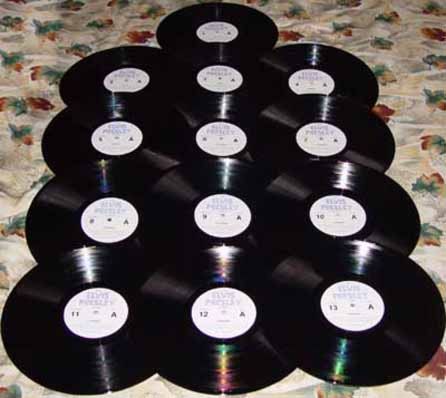
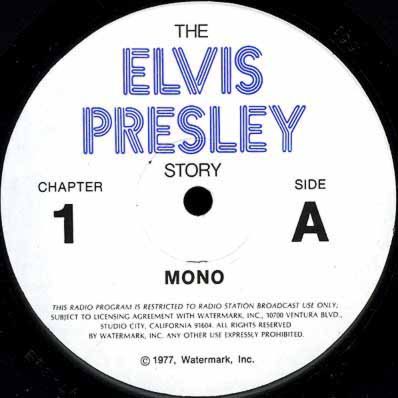
Hour 1
THE EARLY YEARS
Radio report Elvis may be dead, It was shocking but true, Elvis was dead aged 42, and only hours later President Jimmy Carter made a press statement. Read out by "Wink Martindale" for the next 13 hours we give you the Elvis Presley Story, Marion tells of if Sam could find a white man who could sing like a black man he could make a million dollars, medley of his hits. & News clips, Wink Martindale tells the Elvis Presley story, Guy Harris one of Elvis friends from Tupelo Mississippi remembers Elvis as a child, Walter Duncan pastor of Tupelo talks about the religion, Elvis is entered into a talent contest at the Tupelo Alabama State Fair, he sings "Old Shep". At 13 Elvis and his parents moved to Memphis, and some Memphians remember the Presley's when the first arrived, Jake Hess of The Statesman Quartet remembers how Elvis is said to have been influenced Elvis. The Statesman "He Knows Just What I Need" Elvis "He Knows Just What I Need". George Klein talks about Humes High School, and how tough it could be at the school.
1953, Elvis sang for his friends and at school, George Klein remembers Elvis bringing his guitar to school, and talent shows in school, and how Elvis got an encore. Bob Neal got to know Elvis before he started singing professionally and how Elvis used to listen to the black music of the time Arthur Crudup "That's All Right" & Big Mama Thornton "Hound Dog".
Elvis and his family get evicted as they now earn too much, so they are on the move, February 28th 1953 was the date they had to leave. Elvis started looking for work in early 1953 Elvis starts work for Crown Electric, as a truck driver. "Harbour Lights" was one of Elvis favourite songs at the time, plus a medley of some of the songs Elvis would have been listening to over the airwaves while at work. Elvis also loved the gospel groups especially the Black Wood Brothers, "Working On The Building" Elvis "Working On The Building". The Song Fellows were a junior version of the Blackwood Brothers and Elvis auditioned but didn't get the part as the person leaving decided to stay.
Running Time 52'31
Hour 2
THE SUN RECORDS CHAPTER
Sun Records autumn 1953, Memphis Tennessee, Elvis goes to Sun Records to make a record, Marion remembers the day Elvis walked into the studio. Sam Phillips remembers Elvis first audition, Elvis made a second single for himself again in early 1954. Scotty Moore tells of the day Elvis went to his house for an audition, after a few weeks of rehearsing them they went to Sun for the first session, "That's All Right". Scotty tells of how a couple of nights later the got the B. side to the first single "Blue Moon Of Kentucky". Marion explains that this is what Sam was looking for. Elvis single first got plated on Dewey Phillips show "Red Hot And Blue". And how the requests started coming in on the first spin.
Bob Neal tells of Elvis' first show and how he became his first manager, "Good Rockin' Tonight". Elvis was soon off to Nashville to appear on the Grand Ole Opry. Scotty Moore explains how Elvis didn't go down to well. But Elvis gets a contract on the Louisiana Hayride. "You're a Heart Breaker". Elvis now had the name of "The Hillbilly Cat & King Of The Western Bop". "Just Because".
"Milkcow Blues Boogie". Carl Perkins tells of how they used to tour together with Johnny Cash in 1955. D.J Fontana tells of the early tours & Elvis explains his obsession with Cars from The Truth About Me. "Baby Lets Play House". Bob Neal explains how Elvis used to drive the girls crazy during his shows & the boys would get violent against him because of the way there girl friend reacted. "I'm Left, Your Right, She's Gone".
"Blue Moon". D.J Fontana explains how Elvis used to always phone his mother and keep her informed on how he was doing. "I Forgot To Remember To Forget". Bob Neal tells of Elvis main ambition was to become a big star, and always asked if they though he could be a star. The Colonel checks Elvis out before moving in on Elvis contract, he first worked as an agent his first job was a self-proposed job to sell Elvis record contract, he eventually moved to RCA. "Mystery Train"
Running Time 52'09
Hour 3
PRESLEYMANIA
Elvis in the RCA recording studio 1956. "Heartbreak Hotel". D.J Fontana tells of the first appearances on the Dorsey Brothers TV Stage Show. "I Was The One". Between TV appearances he was still on a heavy tour schedule Scotty & D.J remember the tours. Elvis collapse's in on tour in Florida, he's told to rest for a week, he was back on the road the next day. Novelty record version of "Heartbreak Hotel".
"Ready Teddy/Blueberry Hill/Money Honey/Rip It Up/I Got A Woman/Lawdy Miss Clawdy/Long Tall Sally/Shake Rattle & Roll/Tutti Frutti". "Blue Suede Shoes". Carl Perkins said he likes Elvis version of the song as his version was different to his, Ray Walker explains Elvis' music style. Elvis buys his first home for his parents, but the neighbours started complaining, but Elvis was the only one who owned his own home on the street. "I Want You, I Need You I Love You".
Elvis appears on the Steve Allen show, he did a song to shock the TV critics "Hound Dog". Steve Allen explains how Elvis appearance may have appeared as scandalous so for the second appearance they got him to appear in tuxedo and sing to a real hound dog. Elvis gets an invite to the Ed Sullivan Show. "Elvis explains his movements on The Truth About Me", and then again on the record "March Of Dimes". Elvis in 1957 said his favourite song to date is "Don't Be Cruel". Ray Walker & Gordon Stoker tells how good Elvis was in the studio at remembering the lyrics. "Love Me".
Elvis gets a screen test, and then stars in "Love Me Tender" Elvis appeared at the 1956 Tupelo, Alabama & Mississippi state fair. "One Side Love Affair". Love Me Tender was released in November 1956 and then another hit record was released. "Too Much".
Running Time 52'09
Hour 4
PRESLEYMANIA PART II
Spring 1957, Gordon Stoker explains how "All Shook Up" was recorded, and how backing vocalists started getting more jobs because of Elvis. "Loving You". Bob Neal remembers how the Colonel used to licence everything he could on Elvis. "Teddy Bear". Faye Harris remembers hoe Gladys used to worry about Elvis and all the publicity, Vancouver Canada D.J Fontana remembers the wild times, Scotty Moore remembers one date in St. Louis, and how he thought on a number of occasions he thought they were in real trouble. Elvis talks about the fans in a Vancouver interview, "Got A Lot O'Livin' To Do". The bad press hits hard, Gordon Stoker tells of the problems, Elvis studies karate, "Peace In The Valley".
Novelty songs about Elvis, Elvis on Wink Martindale's Dance Party TV Show clip. "Party". Clip from TV Guide, & Vancouver Press Conference. Gordon Stoker & Ray Walker remember the recording session with Elvis and his habit of singing gospel songs before doing the songs he was supposed to do. "Jailhouse Rock". "Baby I Don't Care". September 1957 and Scotty Moore & Bill Black stopped working for Elvis, but they rejoined Elvis a few months later, Elvis recorded his first Christmas album "O Little Town Of Bethlehem". "Blue Christmas". Alan Fortes remembers Elvis filming King Creole, and the crowds that always showed up. "Don't". Elvis is drafted
Running Time 51'57
Hour 5
ELVIS THE PELVIS GOES TO WAR
Elvis in inducted into the army, Scotty Moore talks about the King Creole sessions, "King Creole" Elvis gets a 30 day deferment to finish the movie.
Three Teens "53310761" song about Elvis army serial number, medley of novelty songs about Elvis and his army stint.
$400,000 lost in taxes by Elvis New salary of $78.00. D.J Fontana remembers the '58 session "Wear My Ring Around Your Neck".
Elvis goes to see the movie King Creole, "Hard Headed Woman", Elvis got favourable reviews for King Creole, Elvis returned to the army and he took his mother and father along. Marion Keisker, Gordon Stoker remembers Gladys and the funeral. James Blackwood tells of how the Blackwood Quartet sung at the funeral. "If We Never Meet Again".
Elvis heads for Germany "Elvis Sails". Marion Keisker tells of how Elvis paid for his father and grandmother to come to Germany. "A Fool Such As I"
1959 in Germany Elvis talks to Tom Moffet in Honolulu, Hawaii. Elvis explains he can't stay on the line too long as he was at work. "My Wish Came True". Wally Bean explains the problems Elvis had dating Priscilla, "A Big Hunk O'Love".
Elvis tells Marion Keisker the hard time he had in Germany, on his home trip to the USA. "I'll Be Home Again".
Running Time 52'00
Hour 6
HOMECOMING
Elvis is back on US soil, and the novelty records still keep coming. Scotty Moore remembers Elvis' first post army session, "Dirty, Dirty Feeling". Elvis then appeared on the Frank Sinatra's Timex Show. D.J Fontana remembers the train journey to Miami for the TV Show. "Stuck On You". Minnie Pearl remembers Elvis on his first trip back to Hollywood and how he was so pushed with the amount of commitments he has with movies etc.
Elvis does a cover of O Sole Mio "It's Now Or Never". And Elvis does the Peggy Lee hit "Fever". Everything was back on a roll, Steve Allen comments on the Colonel. "G.I Blues".
"Wooden Heart". Elvis didn't impress critics, but it was still a box office smash. "Flaming Star". Elvis was now spending more and more time in Hollywood, only returning to Graceland between movies. "Clip from Vancouver press conference 1957", Elvis explains how he can't just go out and go to the movies anymore. February 1961 Elvis covers Al Jolson's "Are You Lonesome Tonight". "I Slipped, I Stumbled, I Fell".
James Blackwood talks about Elvis' first Gospel album "His Hand In Mine". "Surrender" Elvis last Live appearance in Hawaii March 25th 1961. Reporter, reporting on Elvis arrival at the airport in Hawaii. Gordon Stoker & Ray Walker remember the live shows in 60 and 61 were just as wild as they were in the 50's. "I'm Coming Home" Elvis stays in Hawaii for his next movie.
Running Time 52'19
Hour 7
THE MOVIE ERA: I - A DECADE OF SECLUSION
Elvis goes to Hollywood "Kissin Cousin's". Radio advert for Follow That Dream "Speedway/Frankie & Johnny", Radio advert for Viva Las Vegas, "Roustabout". Radio advert for "That's The Way It Is". Radio advert for Harum Scarum. "Clambake". Spring 1961 Elvis is in Hawaii "Blue Hawaii". Alan Fortes explains what the Mafia boys did. "Feel So Bad".
Alan Fortes remarks on "Can't Help Falling In Love". Some of the guys tell some stories of Elvis and motor cycles in the 60's. "Good Luck Charm". Between movies some of the stars remember playing football on the movie lots. Otis Blackwell sends Elvis "Return To Sender". Elvis 36th million seller, Otis also wrote the 37th.
"One Broken Heart For Sale". Elvis started to look for a home to rent in Bel Air. "I Love Only One Girl/Girl Happy/One Boy, Two Little Girls/A Boy Like Me, A Girl Like You/Hey Little Girl/Long Legged Girl With The Short Dress On/Meanest Girl In Town/The Girl I Never Loved/I Love Only One Girl". Elvis last film of 1962 "Girls! Girls! Girls!" Jerry Leiber remembers the song "Bossa Nova Baby".
Radio advert for It Happened At The Worlds Fair, Alan Fortes remembers the location shooting for the movie and the problems of getting to work. "Happy Ending". Elvis' Uncle Vester tells of the fans that come to Graceland, also a little tour of Graceland. "Memphis Tennessee". "Fun In Acapulco".
Running Time 52'19
Hour 8
THE MOVIE ERA: II - VIVA LAS VEGAS - KISSIN' COUSINS
Summer 1963, "Devil In Disguise". Elvis is now making three movies a year, "Santa Lucia". Also from Viva Las Vegas, "What'd I Say". After that he was making Kissin' Cousins, Lance Legault talks about how after Viva Las Vegas they started making the movies in a few weeks instead on a few months, "Kissin' Cousins". Radio commercial for Kissin' Cousins.
Minnie Pearl remembers the Colonel also Ray Walker and Gordon Stoker talk about the Colonel & Gordon Stokers talks about the song "Crying In The Chapel", Scotty Moore tells a story about the Colonel. "Ain't That Loving You Baby". Bob Neal tells how the money from the movies were divided up, "Your Cheatin' Heart".
Jerry Leiber talks about one of his songs that were used in Roustabout "Little Egypt". Jerry Leiber explains how the movie songs were put together, Bones Howe explains why Elvis got disenchanted by the movies and movie songs. Medley "Fort Lauderdale Chamber Of Commerce/No Room To Rhumba In A Sports Car/Song Of The Shrimp/Ito Eats/Queenie Wahine's Papaya". Don Seigel explains how Elvis was not given the opportunity to act in his movies, Mildred Dunnock who played Elvis' mother in Love Me Tender explains Elvis acting potential in his first movie. "Clip from Vancouver press conference 1957 Elvis expresses his views on acting". "Down By The Riverside/When The Saint's Go Marchin In".
Alan Fortes, tells how his movie recording sessions were still professionally managed by Elvis "Puppet On A String". Hal Blaine remembers how Elvis and his entourage used to fool around at the sessions between takes, "Do The Clam". By 1965 Elvis was joking more and more on the movie sets just to break up the monotony, Don Seigel remembers. "When It Rains It Really Pours".
Running Time 53'29
Hour 9
ELVIS MEETS BEATLES / MARIAGE
The year of 1965 and times are a changing, but Elvis is still in Hollywood and still doing the formula movies "Old McDonald". Yvonne Craig tells a story about the chimp Scatter that Elvis kept. Alan Fortes explains Elvis' eating habits and how he tried to keep his weight in check. James Blackwood tries to understand Elvis fame. "Long Lonely Highway". Dick Clark said Elvis was about the only star that has not been on his show live. "Down In The Alley".
Elvis sings Dylan "Tomorrow Is A Long Time". Elvis was introduced to Peter Noone in Hawaii on the set of "Paradise Hawaiian Style". The Beatles wanted to meet Elvis in 1964 but nothing came of it but it happened in 1965, John Lennon tells Rolling Stone's magazine about how they wanted to be bigger than Elvis because he was the biggest.
Alan Fortes tells how Elvis recorded Red West's Christmas song "If Everyday Was Like Christmas" Elvis and Nancy Sinatra "There Ain't Nothing Like A Song". "He's Your Uncle, Not Your Dad". Elvis gets married, "You'll Never Walk Alone".
"Big Boss Man". Hal Blaine tells of the later 60's studio and movie recordings. Cecil Blackwood talks about Elvis second Gospel Album "How Great Thou Art". Elvis wins his first Grammy's. A look at the reason why Elvis sales dropped and who was to blame.
Running Time 52'33
Hour 10
CHANGES
1968 Elvis Daughter is born, Billy Strange remembers, Jerry Reed tells of how he had to leave his fishing trip to go to Elvis recording session to do "Guitar Man". "U.S Male". Alan Fortes remembers the times they went to the movies with Elvis and how they got to see first run movies, "A Little Less Conversation".
The 68 TV Special "Memories". Bones Howe talks about the TV Special, and how they would get Elvis to do the show, Steve Binder talks about Elvis and asked Elvis if he would have recorded MacArthur Park. "The Yellow Rose Of Texas/Eyes Of Texas". Steve Binder explains how they wanted the show to go and show Elvis as a human. Bones Howe tells of the recording "If I Can Dream".
Steve Binder tells hoe he suggested getting Elvis old backing band back together, Scotty Moore remembers the rehearsals they did in Burbank. Bones Howe tells of how Elvis was nervous about going out and doing the stand up shows. "Lawdy Miss Clawdy", "Baby What You Want Me To Do", "Love Me Tender" & "Heartbreak Hotel", "Hound Dog", "All Shook Up" & "Can't Help Falling In Love"
Elvis back in Memphis, Marty Lacker talks about the 1969 Memphis recording session, and how he cut 36 tracks, "Only The Strong Survive". Drummer Hall Blaine explains how he recorded "Gentle On My Mind", Mac Davis sends in a selection of tracks for Elvis to possibly record "In The Ghetto", Elvis first message song. Next The King Of The Las Vegas Strip"
Running Time 52'32
Hour 11
KING OF THE STRIP - LAS VEGAS
Summer 1969 Elvis rehearses for his opening in Vegas, "Blue Suede Shoes". Sammy Davis JR, explains why Elvis is the best "Suspicious Minds".
"Johnny B. Goode". David Cramer remembers the opening night of July 1969 and the surprise press interview at the international. Elvis admitted some of the movie songs were weak, and he wanted back into live recordings. Steve Allan talks about Elvis' comeback, November 1969 another million seller "Don't Cry Daddy". As did his next single "Kentucky Rain".
January 1970, Elvis returns to the International Hotel, Las Vegas, Nevada "Proud Mary", "Walk A Mile In My Shoes", "Yesterday", "Polk Salad Annie".
Colonel Parker arranged to have M.G.M film Elvis' summer festival at the International in August "Elvis - That's The Way It Is". John Wilson the assistant director of the International explains the Elvis fans and how they come out of the woodwork whenever he is town. "You've Lost That Loving Feeling". Elvis was awarded his 49th gold record while in Vegas "The Wonder Of You". Bob Neal remembers Elvis in Vegas in 1970 and how he's changed from the 50's, "The Next Step Is Love".
Running time 51'25
Hour 12
GOOD TIMES, BAD TIMES
After Vegas its time to hit the road, and soon he's selling out "Madison Square Garden" "2001 Theme - C, C Rider". While in New York Elvis gives a rare press conference "Clip from Press Conference". Elvis back on the big screen for the last time "Elvis On Tour" radio promo. "Help Me Make It Through The Night/Put Your Hand In The Hand/American Trilogy/Let Me Be There/Don't Think Twice".
Elvis concerts sell out in hours of tickets going on sale "Burning Love". John Wilkinson tells of the night in Vegas where some fans get on stage and a fight breaks out "Steamroller Blues". Elvis' spends hundreds of thousands on friends and charities, some of Elvis' friends and people that knew him try to explain Elvis' spending habits, "I Can Help".
"Patch It Up". October 11th 1973 Elvis and Priscilla separate, Hollywood report, after her divorce she opens a beauty salon then goes on the occasional TV chat show "clip from one of these shows". "Separate Ways". John Wilkinson remembers Elvis' divorce and how Elvis tried to express him self-more, and how Elvis started to a little bit more for the fans on stage, "Talk About The Good Times".
The Good Times, The Bad Times - Elvis' version of his World Tour - Aloha From Hawaii over one and a half billion people see the special "My Way". Neil Matthews of the Jordanaires and Pat Boone explain Elvis' isolation from the world, "I'll Remember You". By 1974 Elvis starts to gain weight and the press notices, John Wilkinson remembers one time when Elvis had flu, but kept working and wouldn't rest, "Help Me".
Running Time 51'36
Hour 13
THE FINAL CHAPTER - A TRIBUTE
"Moody Blue". Elvis is set to go on tour on August 16th 1977, but that tour never came, Elvis is found dead, Doctors at the Baptist Memorial Hospital give a press release. Vera Presley and others remember the day he died "Crying In The Chapel". News reports from around the world August 16th - 18th 1977. James Bruce Memphis funeral director remembers the crowds, D. J Fontana talked to Vernon soon after the funeral. News report of the funeral in Memphis. J.D Sumner talks about the service. "Promised Land".
"Hurt". Carl Perkins pays tribute to Elvis. And other associates remember Elvis, "Stand By Me". More from Elvis' friends and people that knew him, "Raised On Rock".
Elvis from around the world after his death, and some of the feats he managed in his lifetime. Colonel Parker states Elvis' spirit continues in our memories, Sammy Davis JR. remembers Elvis, Radio clips from around the world, "I Got A Thing About You Baby".
The Final page, 1971 Elvis is named outstanding young man of the year, "Clip from presentation". "Medley of all his hits"
Running Time 49'58
Hour 2, 3, 4, 5, 6, and 10 are rigoursly the same for the 3 editions
Hour 1 track 1 is different for the 3 editions - Track 2, 3 and 4 are identical for the 3 editions
Hour 7 track 3 is different for the 1971 edition but is the same for the 1975 and 1977 editions.
Hour 8 track 4 is identical for 1971 and 1975 but a small difference with the 1977 edition
Hour 9 track 2 is different for the 1971 edition but is the same for the 1975 and 1977 edition.
Hour 11 Track 1, 2 and 3 of the 1971 edition are the same as the 1977 edition. Track 4 of of the 1971 edition is different than the 75 and 77 edition - Track 2 and 4 of the 1975 edition are different than the 1977 edition.
Hour 12 is different for all the tracks and for each edition.
Hour 13 is different for all the tracks and for the 1975 and 1977 editions.
Back To Main Menu
